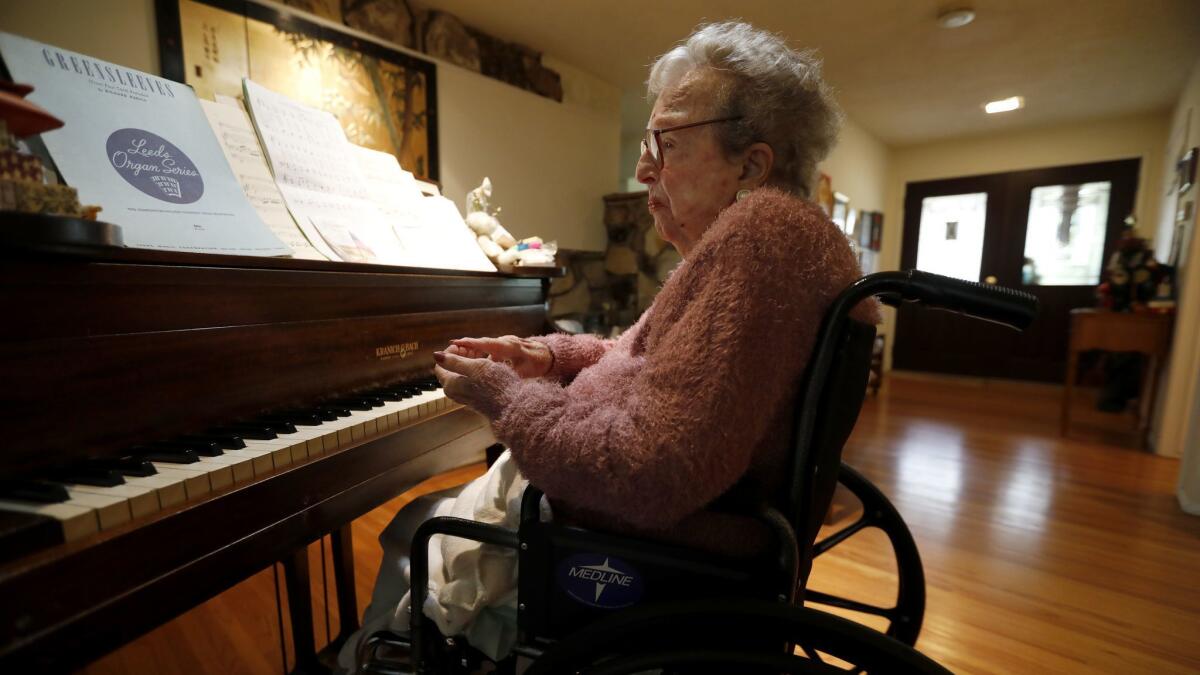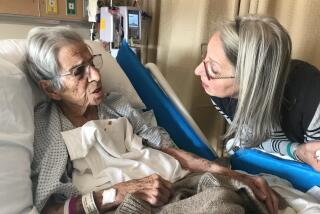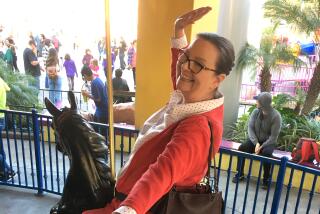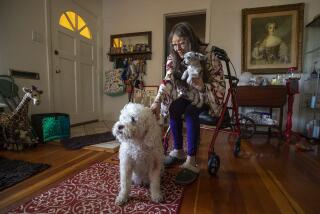Column: At 92, Happi Hicks is ‘too blessed to be stressed.’ All hospice care should be this way

Her name is Hazel, which tells you something about her age, but she goes by “Happi.”
Happi Hicks.
Two weeks ago, when I wrote about my mother’s final days in hospice care and asked readers to share their own stories, Mrs. Hicks weighed in.
“Sorry about your bouts with Hospice!” she emailed. “Your mom’s final days should have been more pleasant! As of today, I’m 93 years YOUNG & on Hospice! Mine is GREAT!”
OK, she’s on hospice, she goes by “Happi” and she sounded cheerful enough to have earned the name. I knew I had to pay a visit to her in La Canada.
But let me back up.
I was hoping for a few good leads when I wrote that column about my mother. I was not expecting an avalanche. If I haven’t gotten back to you, my apologies. I’ve been through hundreds of responses (many of them longer than the column I wrote), but I still have several hundred more to go.
I suppose I shouldn’t be surprised. More than 1 million people enter hospice each year in the United States, and most of them have others involved in their care.
I heard from doctors, nurses, hospice-care operators, patients and their loved ones. What I’ve gleaned from all those people echoes what I said in my first column:
Hospice care can be the best option at the end of life, and the experience is generally a positive one for patients and families. But the rapid growth of the now-$17-billion industry, and its transformation from a nonprofit movement to a largely corporate, for-profit enterprise, has led in some cases to fraud, spotty care, unnecessary suffering, and too little oversight and regulation.
Dozens of readers identified with my own family’s experiences. We found that most of the hospice nurses and other medical professionals who visited my mother and father did terrific work, but there were a lot of missed appointments and other screw-ups that were stressful, heartbreaking and unforgivable.
In just a a few sentences, a nurse who worked in hospice for 20 years offered a partial explanation:
“The culture began to change in early 2000,” she said. “The drive to enroll as many patients as possible, reduce the per patient cost to better align with Medicare reimbursements, and increase our productivity as nurses became a serious stressor on our patients. And on us. There were many times I broke down and cried knowing I was not permitted to provide the kind of care I came into hospice to do.”
In future columns I’ll take a closer look at all that, as well as what you need to know about how to engineer a more positive experience, and what reforms are needed.
But let me get back to Happi Hicks, who has a lesson for all of us on how to face the inevitable with courage, grace and good punctuation.
“Roger, a hospice nurse, came to my house an hour ago & I’m just now getting back to my computer!” she wrote one day, attaching three short stories she has fashioned, one of which is on the subject of, what else, happiness.
She signed off:
“Happi Hugs!”
A live-in health aide answered the door at Mrs. Hicks’ home in La Canada, and another aide was also at the house. But they don’t work for the hospice agency. Mrs. Hicks hired them independently, which is expensive, and not everyone can afford to supplement hospice care in that way. Hospice, which is covered by Medicare, is not an around-the-clock service. A doctor might or might not visit, a nurse will typically make short visits one or more times a week, depending on the patient’s condition. And hospice aides visit the patient on other days.
Mrs. Hicks was in her computer room, seated in a wheelchair and working on her correspondence. On her screen were emails to and from her friends Patricia and Lily.
“My hearing aids have had a long life, and so have I,” she said, adjusting her ear buds so she could hear me.
Mrs. Hicks was hospitalized recently for an infection and she has trouble breathing, but no trouble talking. Over the course of two hours, in the golden glow of afternoon light filtered by the trees outside her window, she shared with humor, sorrow and wit her life’s joys and heartbreaks. But first she handed me her business card, saying that she has given them out by the thousands over the years.
Hazel “Happi” Hicks
Organist * Pianist
On the bottom of the card is this:
“Too blessed to be stressed!”
Death may not be at the door just yet, but it’s in the neighborhood. Still, Mrs. Hicks said she doesn’t fret, and by the way, she was on hospice once before, a couple of years ago, and made a clean getaway. She said she has a photographic memory and a sharp mind, which, at her age, she counts as a blessing.
“When I wake up in the morning, I pray,” she said. “I say, ‘Thank you, God, for another day.’ ”
She recited verbatim the words I would find if I flipped her business card over.
“Thousands of angels surround you at this moment, loving and supporting you...You have nothing to fear. All is well.”
The more Mrs. Hicks spoke — about her childhood in Colton, her love of music, her long career as a church organist and pianist, the loss of her middle child in a car accident and her beloved husband to cancer at the age of 59 — the more I wondered if calling herself “Happi” was both a genuine description of her true nature and a way of coping with loss.
Her friends told me there may be something to that, but they said her sunny outlook is her signature quality.
For years, La Canada Presbyterian Church pastor Chuck Osburn knew exactly where to find her during services.
“There’s Happi, right up front, and like a cheerleader,” he said. “Always positive, always life-affirming.”
“Every organist in L.A. County knows her,” said Jack Lantz, the church’s music director. “Up until this hospice, she would attend our concerts when she was still driving. She would go pick up various people she thought should hear our music. Some were friends, some were acquaintances, and she’d come in with a carload.”
During my visit I asked Mrs. Hicks how she came by her nickname. She said she played golf for 35 years, tended to hook the ball to the left, and her friends seized on that.
“Every time I’d hit the ball they’d scream, ‘There she goes, the happy hooker.’ I said, ‘I like the ‘happy’ part but please don’t say ‘hooker,’ because I play the organ in church every Sunday, and they’re going to wonder what I do on Saturday night.”
But why “Happi” rather than “Happy”?
“There was another Happy living in La Canada,” said Mrs. Hicks. “I wanted to be different.”
Mrs. Hicks still tickles the keyboards now and then, she loves visits from friends, and she’s working on a short story — this one based on her experience putting a jazz band together 75 years ago and traveling by bus and on foot to play for troops at a San Bernardino County USO event.
As sharp as she is, math might not be one of Mrs. Hicks’ strong suits. She said in a couple of emails that she had just turned 93, but also that she was born on Jan. 25, 1927.
I emailed to tell her that unless I was missing something, she just got younger by a year. She’s not 93, she’s 92.
“Thanks for the REAL info!” she wrote back.
She also said:
“I feel like 73.”
Get more of Steve Lopez’s work and follow him on Twitter @LATstevelopez
More to Read
Sign up for Essential California
The most important California stories and recommendations in your inbox every morning.
You may occasionally receive promotional content from the Los Angeles Times.











